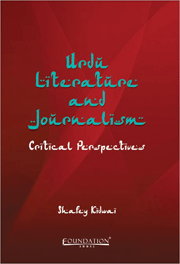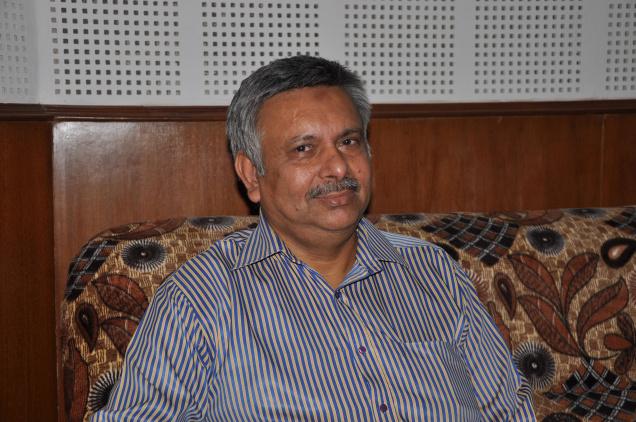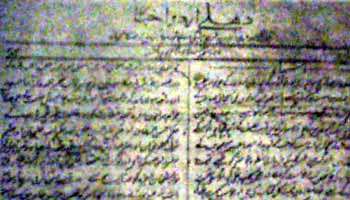By Mohammed Anas for TwoCircles.net,
After gifting us insightful glimpses into geniuses of Rabindranath Tagore, Mirza Asadullah Khan Ghalib, Raghupati Sahay Firaq Gorakhpuri, Faiz Ahmed Faiz and first Dalit Urdu poet Jayant Parmar, Professor Shafey Kidwai of Aligarh Muslim University has explored journalistic conquests of greats like Sir Syed Ahmed Khan, Maulana Abul Kalam Azad, Maulvi Mohammed Waqar, etc in his book masterfully written Urdu Literature and Journalism: Critical Perspectives.
Reviews focusing on literary portions of the book have appeared in various newspapers like The Hindu, The Statesman and The Sunday Guardian. Hence, this article attempts to comment on Kidwai’s write-ups on the early period of Urdu Press.

Kidwai’s essay on the role of Urdu journalists in the First War of Independence itself seems a journalistic account of the 1857 Uprising and its coverage in the Urdu press, which at that time was also the voice of the masses and their window into the life in Delhi during the British Raj rule. Maulvi Mohammed Waqar, the indomitable editor of the Delhi Urdu Akhbar, was the protagonist of the “Protest Press”, as the local press came to be known then.
For Waqar, journalism was no less than jihad and his pen his sword, as Kidwai writes of him: “Moulvi Mohammed Waqar was an avowed enemy of those who were loyal to the British and he would come down heavily upon them. According to him, their support to the alien rule essentially betrayed their own faith…”
Delhi Urdu Akhbar, writes Kidwai, was the first Urdu newspaper of North India. It started in February 1837 as a weekly. It dutifully recorded the cultural, social and political life of Delhi of that period and commented on decadence which had sharply crept in. It reported on the functioning of the Royal Court and the East India Company. Waqar himself wrote a regular column, Huzoor-e-Wala (His Excellency) giving accounts of the life within four walls of the Red Fort, the empire of Bahadur Shah Zafar. “It was a complete newspaper, fully compatible with its English contemporaries. Waqar has put premium on authenticity and objectivity and asked its correspondents not make use of hearsay and unattributed information,” writes Kidwai.
When Mutiny broke on 11 May 1857 and mutineers broke into Delhi, Akhbar devoted its entire front page to their gallantry and showed little sympathy to their victims. Maulvi Waqar himself wrote first person account of violence and mayhem that engulfed Delhi in those eventful days. Perhaps, notices Kidwai, it was the first example in Indian journalism of “spot reporting”.
Waqar paid with his life for his uncompromising anti-British stand: he was shot dead by the firing squad. He is remembered as the first martyred journalist of India.
Other Urdu newspapers which played pivotal role in sympathizing with the mutineers and drumming up anti-British mood in Delhi and North India were Sadiqul Akhbar, Umdatul Akhbar, Habibul Akhbar, Akhbar Murtazai and Tilism e Lucknow etc. All these periodicals faced British ire and their editor and publishers were punished by the Raj in one way or the other. And then emerged pro-British Syed Ahmed Khan on the firmament. Khan cajoled natives to cooperate with the British and British to be tender with the locals. Khan’s multilingual The Aligarh Institute Gazette and Tahzibul Akhlaq though were stigmatised by the locals as sycophants of the British, they also took firm stand against British officials who treated their Indian subordinated with undue harshness.
Before starting Gazette and Akhlaq, Khan had started Loyal Mohammedans of India, which lasted only upto three issues, but it was aimed to convince British that local Muslims were not at the forefront of 1857 Uprising and rather they helped save lives of the Raj officials during the upheaval. Besides, Khan contributed regularly to newspapers like Syedul Akhbar and Zubadatul Akhbar, both in Urdu and Persian, on range of topics.
Interestingly, it was not any Aligarian who carried Sir Syed’s torch ahead, it was scholar-politician Maulana Abul Kalam Azad who took to the profession of pen as early as an 11-year-old when he launched his own publication Guldasta. Azad then wrote for various leading periodicals of the time like Al Miswah, Ahsanul Akhbar, Khadange Nazar, Lisanul Sidq, Al Nadwa, Wakeel, Darul Saltanat, etc.
“No other famous journalist, political leader, educationalist or litterateur can compete with Azad, as far as adequate acquaintance with the professional framework of journalism, is concerned,” writes Kidwai of Azad’s journalistic talents. Azad’s journalistic pursuits reached climax when he launched Al Hilal in 1912. Azad, according to Kidwai, put premium on enlightenment of the masses.

Azad’s journal covered every possible aspect of journalistic enterprise: it took stand against malignant social conditions prevailing during that time, strongly condemned Hindu-Muslim enmity, vehemently opposed the two-nation theory, exposed the oppressive policies of the British Raj and even commissioned people to write on international issues of the time. It regularly borrowed pieces from international newspapers like The London Times and The Manchester Guardian. It soon became popular and thus invited wrath of the government. Al Hilal was banned and Azad was jailed. But when he was released, he started Al Balagh but it was banned too.
“Having completely dissatisfied with the nascent journalism in Urdu, Azad made it a point to supplement what had been completely ignored. Enrichment was his basic concern and he published seminal and thought-provoking articles that were intended to enlighten people on all possible questions related to their life. The current media has been pursuing ‘Infotainment’ model. If one has to describe Maulana’s model of journalism, he would describe it as the ‘Inforichment’ model,” writes Kidwai of Maulana’s passion for journalism.
And seeing the corroding quality in present age Urdu journalism, we can only hope that it’s high time that we rekindle passions of Azad, Sir Syed and Maulvi Waqar.


